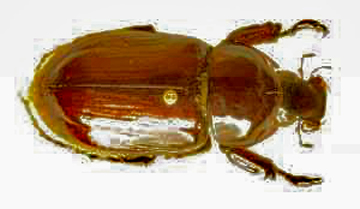PHILADELPHIA — The U.S. Department of Agriculture (USDA) confirmed on Monday that a scarab beetle that U.S. Customs and Border Protection (CBP) agriculture specialists intercepted in a shipment of Costa Rican pineapples is the first recorded find of this species in Philadelphia.
CBP discovered the beetle March 11 in a container of 1,500 cases of fresh pineapples. CBP secured the pineapple shipment for fumigation, and submitted the pest specimen to the local USDA entomologist for identification.
The entomologist identified the species as Aspidolea sigularis of the Scarabaeidae family, a species known to occur in Panama, Nicaragua, Colombia, and Costa Rica, and advised CBP that the insect is a pest new to the Philadelphia area. The national pest identification database confirmed this claim on Monday.

Philadelphia CBP discovered the area's first Aspidolea sigularis of the Scarabaeidae family in a shipment of Costa Rican pineapples on March 11, 2016. USDA confirmed the first in port discovery on Monday.
According to the USDA, beetles of the family Scarabaeidae pose a significant threat to the agriculture industry as some cause significant damage to plants when feeding thereby reducing crop yield.
“Intercepting destructive insect invaders at our nation’s borders, and before they can threaten our agriculture industries, is of great importance to Customs and Border Protection,” said Susan Stranieri, CBP Area Port Director for the Port of Philadelphia. “CBP agriculture specialists take their job very seriously, and recording this ‘first in port’ insect interception is a significant discovery.”
CBP agriculture specialists have extensive training and experience in the biological sciences, risk analysis, and in imported agriculture inspection techniques. CBP agriculture specialists are the first line of defense in the protection of U.S. agriculture, forest, and livestock industries from exotic destructive plant pests and animal diseases.
On a typical day nationally, CBP agriculture specialists inspect over 1 million people as well as air and sea cargo imported to the United States and intercept 4,548 prohibited meat, plant materials or animal products, including 470 agriculture pests and diseases. Read more about CBP’s agriculture protection mission.
CBP routinely conducts inspection operations on arriving and departing international flights and intercepts narcotics, weapons, unreported currency, prohibited agriculture products, and other illicit items. To read more about CBP click CBP Snapshot.

